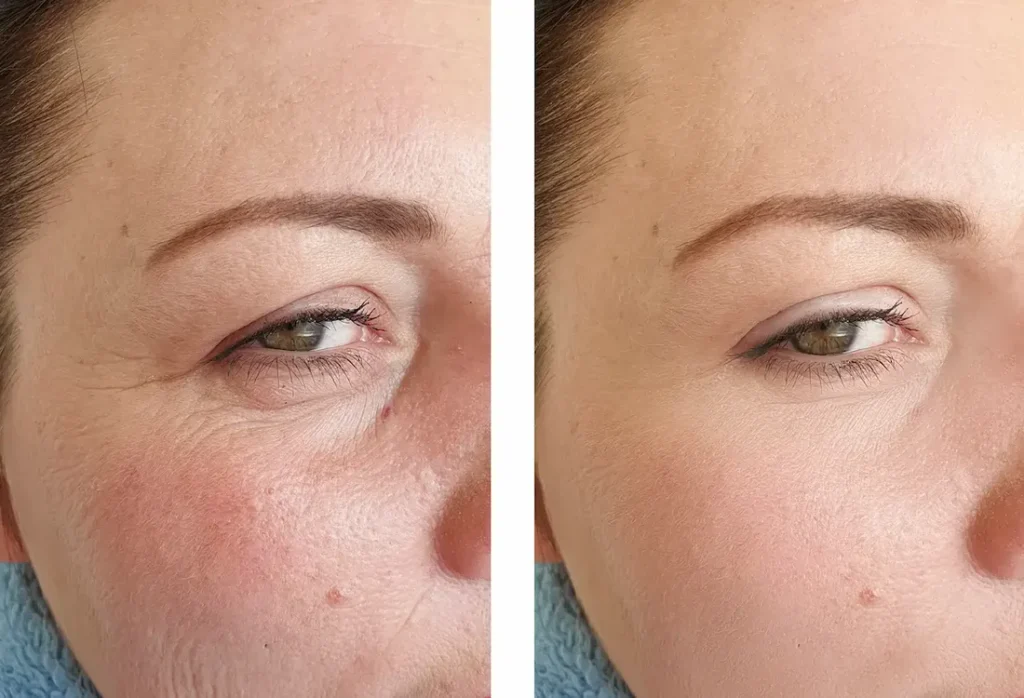🌟 Hello! How Are You All?
Let’s talk about the most sought-after topic for better skin: retinol. Today we are discussing retinol, a derivative of vitamin A.
🌼 Benefits of Retinol
Yes:
- It increases collagen synthesis because of enhanced cellular turnover.
- It improves fine lines, blemishes, and open pores.
- It works well on dark spots and superficial scarring and reduces dullness of the skin.
- It makes your skin look plumper and fresher.

There are two very important things to remember when using Retinol
- It increases your photosensitivity, so it should only be used at night.
- Even that next morning or for a couple of days, you must not skip sunscreen to protect your skin from environmental damage.
✅ Checklist Before Starting Retinol
There are about 4–5 very important things to check before starting retinol:
- You should not be pregnant (during pregnancy or lactation, and even if you are planning to conceive, you should not use retinol).
- If you already have very sensitive skin
- If it is itchy or dry, then retinol is not recommended.
- If your skin is sun-damaged, extremely dry and flaky, then do not start retinol.

Medicated vs. Cosmetic Retinol
Medicated retinol often comes mixed with vitamin E or other moisturisers, which is safer.
But with cosmetic products, no one can guarantee what is in them, so please use them carefully and wisely
one more important things
- Do not use it every night from the start.
- Start with once a week, allow your skin to settle, and then slowly increase the frequency.
- For girls and women who have used a lot of whitening creams or chemical peels and whose skin has already thinned, please do not use retinol.
Still Worried? Try a Patch Test
- Do a patch test and try it behind your ear, on your neck, or on your hand.
- Apply it at night and see the next day.
- If there is redness, itching, or dryness, it means your skin is still sensitive and needs more moisturisation.
Tip: Mix a little moisturiser with your retinol to dilute it before applying.
When to Avoid Retinol?
- When you are continuously busy outdoors, exposed to the sun a lot (like during weddings, cooking long hours, and big projects), skip retinol those days.
👁️ Around the Eyes
- The skin is already very thin, so it is better not to use retinol there.
- But if you are using it once a week and it is helping without issues, then that’s okay.
👵 A Note for Older Skin
One more point:
Sometimes patients come to me, a woman around 65 years old, with skin getting dry due to menopause and hair also drying out, and just because her daughter suggested it, she has started using retinol.
Please don’t do that.
Your skin at that age needs hormone support and extra care, not harsh active ingredients.
👩🦰 In Your 20s? Here’s How to Use It
For those in their 20s, then you can use it on alternate days after your skin adjusts
Very Important Tips for Safe
- Always use a good SPF (Sun Protection Factor) and moisturiser with retinol.
- Avoid using retinol together with salicylic acid, vitamin C, azelaic acid, niacinamide, and anything that could make your skin even more sensitive.
(This wasn’t told by others — I’m telling you personally.)
Conclusion
Following this guideline means following this right combination and forgetting the bad combination of things; you can get the many skin benefits that retinol gives you, leading to healthier and more glass-like skin.
Navigating the world of retinol skin care can be both rewarding and challenging, yet adhering to essential guidelines ensures optimal results while minimising potential irritation. The importance of pairing retinol with a high-quality SPF and moisturiser cannot be overstated, as these products provide crucial protection and hydration.
It is equally vital to steer clear of using retinol in conjunction with ingredients such as salicylic acid, vitamin C, azelaic acid, and niacinamide, which can exacerbate sensitivity and undermine the effectiveness of your routine.
By thoughtfully selecting compatible products and combinations, individuals can cultivate a regimen that promotes healthier, more radiant skin. Ultimately, a balanced approach to incorporating retinol not only enhances skin texture but also fosters confidence in one’s complexion.
